The immune system probably doesn’t get enough credit for the incredible job it does.
See, immunity is a complex and delicate balancing act — protecting the body against unwanted germs (microbes) — then keeping a record of these microbes so the system knows what to do if these bad guys come knocking again.
And you’ve no doubt heard about some of the ways we can bolster our immunity, like adopting a healthy diet, regular exercise and a good sleep pattern.
But have you heard about medicinal mushrooms and their powerful immunomodulating agents?
Turns out, the world of fungi has the potential to support a healthy immune function and response.
So, how do mushrooms work alongside the immune system?
What are the best mushrooms for immunity?
And how can you incorporate them into your diet?
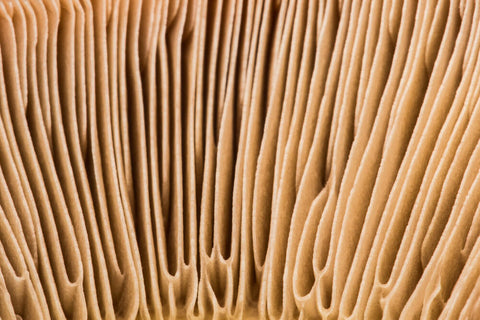
What are medicinal mushrooms?
Sure, “medicinal mushrooms” may sound scary at first, but they aren’t to be confused with the psychedelic kind.
By definition, medical mushrooms are macroscopic fungi, used in the form of extracts or powder, for medicinal and nutritional purposes.
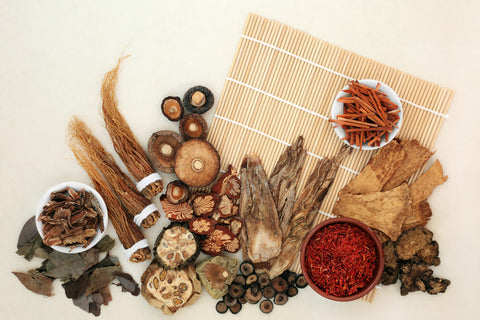
So, do mushrooms increase immunity?
In short, yes. Mushrooms have the potential to increase immunity due to their high concentration of “active compounds” which can trigger immunological activity.
And to get a little more specific, medical mushrooms contain a particularly high concentration of active polysaccharides — which is a fancy word for long chain carbohydrates. The most common polysaccharide in mushrooms is beta-glucan, which can activate immune cells, increase antibody production and reduce inflammation.*
Don’t believe us? All you have to do is look into modern pharmaceutical products and you’ll find that most are derived from the fungi kingdom. Even penicillium originated from a species of fungi!
*Take note: mushrooms may not always be right for your particular condition or circumstances. You should always consult a doctor or medical professional before taking mushroom supplements. Like most natural medicine, medicinal mushrooms are an area of science that’s still evolving.
So, what are the best mushrooms for immunity?
It’s hard to choose the best medicinal mushrooms for the immune system because they all boast powerful benefits. So, let’s look at our top 6 and some of the accompanying research.
Lion’s mane for immunity
Also known as bear’s head, pom pom or old man’s beard, lion’s mane is a shaggy mushroom found on dead or decaying hardwood throughout Asia.
A 2017 study explored lion’s mane and its impact on the immune response of mice.[2] Fascinatingly, the results found lion’s mane may increase intestinal activity and encourage the growth of good gut bacteria (which has flow on effects for immunity).
Immunity aside, lion’s mane may also…
- Boost mood
- Enhance memory
- Mental clarity
- Increase focus
Turkey tail for immunity
Turkey tail is a stunning bracket fungus that spurts out of tree trunks and dead or decaying hardwood. While we don’t like to play favourites when it comes to immune-boosting mushrooms, let’s just say the turkey tail research is nothing short of exciting. So much so, countries like China and Japan have been using turkey tail in conjunction with traditional cancer medicine for over 30 years.[3]
A 2009 study involving 63 elderly patients with bowel cancer found that relapse-free survival rates increased in the group that was treated with a turkey tail compound.[4] Secondly, a 2016 test tube study found that turkey tail mushroom could stop the growth of harmful bacteria, including Staphylococcus Aureus and Salmonella Enterica.[5]
The other benefits of turkey tail may include…
- Aid digestion
- Promote good gut bacteria
- Reduce inflammation
- Improve vitality and longevity
Reishi for immunity
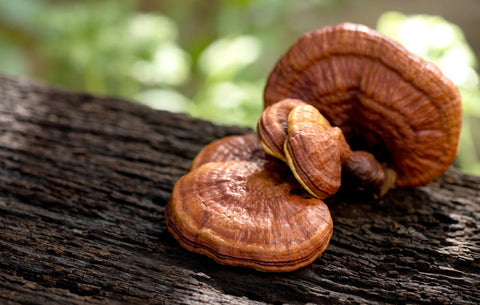
Reishi is one of the most well-known medicinal mushrooms (and, well, we can see why). In traditional Chinese culture, this beautiful kidney-shaped mushroom symbolises success, wellbeing and longevity. One of the ways it’s believed to boost immunity is by strengthening the white blood cells, which play a critical role in our immune system function.
One study on 34 advanced stage cancer patients found that reishi could increase the number of natural killer cells (NK cells) which play an important role in rejecting tumours, cancer cells and other diseases. It’s important to note that more research is needed to determine the extent reishi can assist immunity in both healthy and ill individuals.
Other benefits of reishi may include…
- Reduce stress
- Lower fatigue
- Improve sleep
- Enhance energy
Maitake for immunity
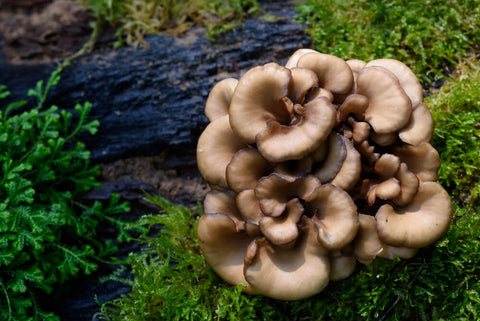
A real silent achiever, maitake is not very well known in the western world. Yet studies show it has promising potential to boost immunity. Maitake often grows out of the forest floor as a series of frilly, brown caps (often looking like a bird’s plumage, hence the commonly referred name “hen of the woods”).
A mice study in 2019 found that maitake may suppress tumour growth by enhancing the immune system and increasing the number of cells that help fight the tumour. [6] But as is often the way, it’s too earlier to draw any conclusions (we need time and more human studies).
Other benefits of maitake may include...
- Lower cholesterol
- Lower blood sugar
- Promote heart health
Chaga for immunity
Found on the bark of birch trees in cold climates, chaga has a black exterior and a soft, orange interior. And we can’t mention chaga without mentioning antioxidants — it’s chock-full of them! And these antioxidants help to neutralise free radicals and reduce inflammation (which is linked to our immune system).
A petri dish study found that chaga could exhibit natural anticancer compounds, and ultimately slow the growth of lung, breast and cervical cancer. Once again, this is early days, and more research is absolutely necessary.
Other benefits of chaga may include…
- Relieve stress
- Healthy, glowing skin
- Slow the ageing process
Cordyceps for immunity
In the wild, cordyceps grow out of the brains of insects and spiders. But luckily for us, scientists have uncovered ways to commercially cultivate cordyceps (in a lab rather than insects) which has increased its availability around the world (which is also a nice touch for vegans and vegetarians).
Similar to other medicinal mushrooms, cordyceps can help the body react when it’s challenged by germs, infection or disease. One study found that cordyceps could enhance immunity in immunosuppressed mice.[7] Test tube research has also found that cordyceps could prevent the growth of various types of human cancers. [8] Watch this space.
Other benefits of cordyceps may include…
- Boost athletic performance
- Increase libido
- Increase endurance and stamina
How to take medicinal mushrooms
Moral of the story? Research to date suggests medicinal mushrooms are damn good for your immune system.
So, how do you get them in your diet?
Some varieties are popular in cooking (like maitake and lion’s mane) because they taste delicious. But unfortunately, there’s a lot of time and preparation involved in cooking, which is why many fungi fans opt for supplements they can take regularly like powders, liquid extracts and capsules.
You can incorporate these supplements into your diet by adding them…
- To your morning coffee or tea
- To smoothies or juices
- To soups or main meals
- Straight into your mouth
To learn more, read through our article on how to take medicinal mushrooms.
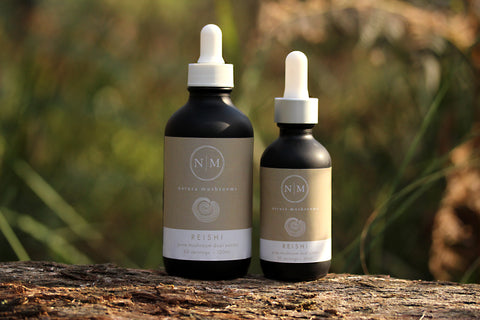
Mushrooms for immunity at Natura Mushrooms
At Natura Mushrooms, we grow, harvest and source a range of immune-boosting mushrooms on our 100% off-grid farm in Gippsland, Victoria.
You can discover our range here...
- Mushroom powders (hot water extraction)
- Mushroom dual liquid extracts
- Mushroom dual liquid extracts and hemp seed oil
Still not sure? Take a look at our mushroom supplement purchasing guide to find the best solution for you.
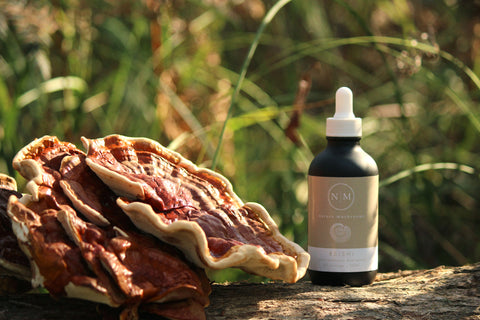
Resources:
- Medicinal Mushrooms: The Essential Guide by Martin Powell
- https://pubmed.ncbi.nlm.nih.gov/28266682/
- https://naturamushrooms.com/blogs/news/turkey-tail-mushroom-and-cancer-research
- https://pubmed.ncbi.nlm.nih.gov/19243246/
- https://www.ncbi.nlm.nih.gov/pmc/articles/PMC4972825/
- https://pubmed.ncbi.nlm.nih.gov/23280601/
- https://www.sciencedirect.com/science/article/abs/pii/S014486171200241X
- https://pubmed.ncbi.nlm.nih.gov/26263965/
